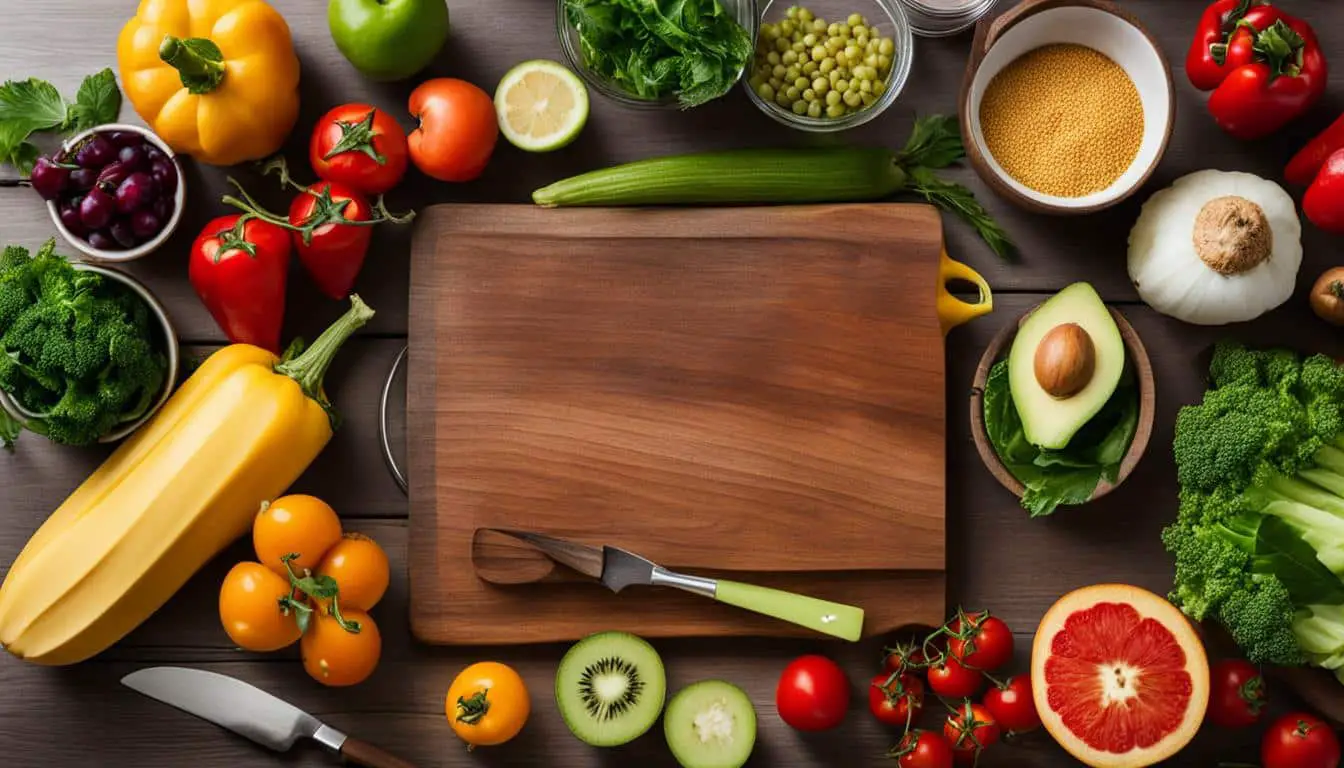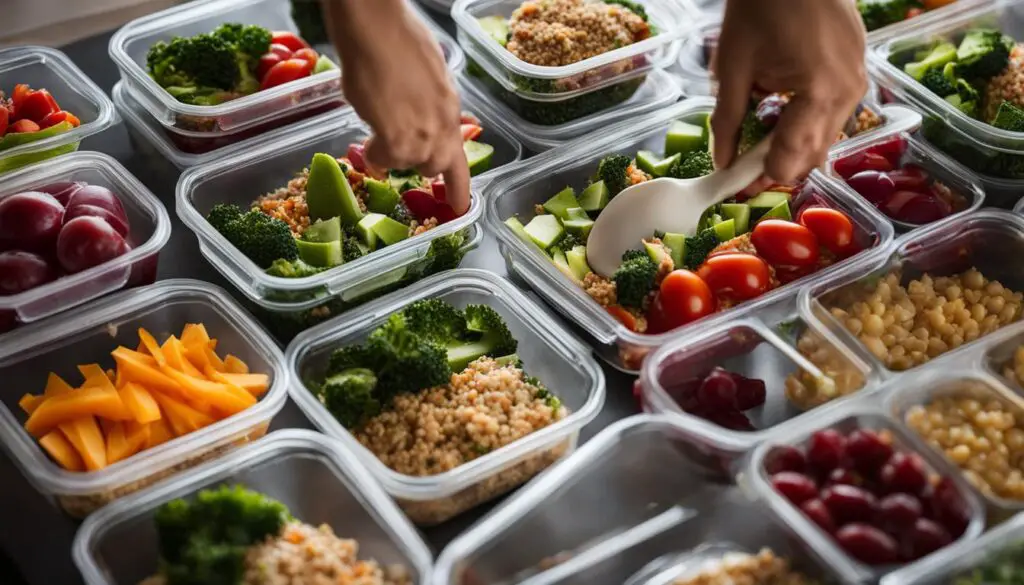
Healthy Meal Planning Strategies for Busy Families
Meal planning is essential for busy families to ensure they have healthy and delicious meals on the table. It saves time, reduces food waste, helps with budgeting, and ensures a balanced plate. Here are some strategies to make meal planning easier for families.
Key Takeaways:
- Meal planning is crucial for busy families to save time and reduce food waste.
- It helps with budgeting and ensures a balanced plate.
- Start small and keep it simple if you’re new to meal planning.
- Consider using time-saving techniques like meal prep and batch cooking.
- Having a list of quick and easy meal ideas can be a lifesaver.
Why You Should Meal Plan
Meal planning offers numerous advantages that can streamline your daily routine and improve your overall well-being. Taking the time to plan your meals in advance can have a significant positive impact on your life, helping you save time, money, and reduce food waste. Let’s explore the benefits of meal planning further:
Saves Time
One of the key benefits of meal planning is the time-saving aspect. By dedicating a small amount of time each week to plan your meals, you eliminate the need to decide what to cook day by day. With a well-thought-out meal plan, you know exactly what ingredients you need and what steps to follow, making your cooking process faster and more efficient.
Saves Money
Meal planning can also help you save money by avoiding impulsive takeout orders or last-minute grocery store trips. When you plan your meals in advance, you can take advantage of sales, buy ingredients in bulk, and avoid wasting money on items you don’t need. By sticking to your meal plan, you create a budget-friendly approach to your grocery shopping and make the most of the ingredients you have on hand.
Reduces Food Waste
By utilizing ingredients that you already have in your fridge, freezer, and pantry, meal planning helps reduce food waste. Often, we end up throwing away forgotten or spoiled ingredients because we don’t have a plan for using them. However, with a meal plan, you can intentionally incorporate these items into your meals, ensuring that nothing goes to waste.
Meal planning allows you to create a cohesive plan that maximizes the utilization of ingredients, reducing food waste and benefiting both your wallet and the environment.
Overall, meal planning is a valuable tool that not only saves you time and money but also promotes a more sustainable approach to your food consumption. By reducing food waste, you contribute to a healthier environment and encourage mindful eating habits. Whether you’re a busy professional, a student, or a parent, meal planning can simplify your life and provide you with a nourishing and satisfying culinary experience.
Meal Planning for Busy Families – Top 10 Tips
Meal planning can be a lifesaver for busy families looking to save time and enjoy nutritious meals together. Here are my top 10 time-saving meal planning tips:
- Plan your meals in advance: Take a few minutes each week to plan your meals. Consider your family’s preferences, dietary needs, and schedule. This will help you stay organized and avoid last-minute meal decisions.
- Create a weekly menu: Once you have your meals planned, create a weekly menu that you can refer to. Display it in a visible place, such as on your refrigerator or a family bulletin board.
- Make a detailed grocery list: Based on your weekly menu, create a detailed grocery list. This will ensure you have all the ingredients you need for your planned meals, eliminating the need for frequent trips to the store.
- Utilize leftovers: Don’t let leftovers go to waste. Incorporate them into future meals or repurpose them creatively. For example, turn leftover chicken into a delicious sandwich or use cooked vegetables in a stir-fry.
- Batch cook: Consider batch cooking on weekends or during less busy times. Cook large quantities of staple ingredients such as rice, quinoa, or roasted vegetables. This will save you time during the week when preparing meals.
- Prep ingredients in advance: Dedicate some time each week to chop vegetables, marinate meat, or prep sauces and dressings. This will streamline your meal preparation process and save you considerable time.
- Try one-pot or sheet pan meals: Opt for meals that require minimal cleanup by preparing everything in one pot or on a single sheet pan. This not only saves time but also reduces the number of dishes to wash.
- Use time-saving kitchen gadgets: Invest in time-saving gadgets like a slow cooker or an Instant Pot. These appliances allow you to set and forget your meals, saving you valuable time in the kitchen.
- Involve the whole family: Get your family involved in meal planning and preparation. Assign everyone a task, whether it’s choosing a recipe, setting the table, or helping with the cooking. This not only reduces your workload but also fosters a sense of togetherness.
- Keep it flexible: Remember that meal planning is meant to simplify your life, not add stress. Stay flexible and be willing to adapt your plans as needed. It’s okay to swap meals or order takeout occasionally when life gets too hectic.
By implementing these time-saving meal planning tips, you can save precious time and energy while ensuring your family enjoys delicious and healthy meals together.
| Tips | Benefits |
|---|---|
| Plan your meals in advance | Saves time and reduces decision fatigue |
| Create a weekly menu | Keeps you organized and eliminates meal-time stress |
| Make a detailed grocery list | Avoids unnecessary trips to the store |
| Utilize leftovers | Reduces food waste and saves money |
| Batch cook | Saves time during busy weekdays |
| Prep ingredients in advance | Streamlines meal preparation |
| Try one-pot or sheet pan meals | Minimizes cleanup and dishwashing |
| Use time-saving kitchen gadgets | Efficiently cooks meals with minimal effort |
| Involve the whole family | Fosters togetherness and reduces workload |
| Keep it flexible | Adapts to the demands of a busy schedule |
Getting Started with Meal Planning
If you’re new to meal planning, it’s important to start small and keep it simple. Meal planning can seem overwhelming at first, but with a few practical tips and strategies, you’ll be able to get started without feeling overwhelmed.
Picking Themed Nights
One approach to simplify your meal planning process is to pick themed nights. Themed nights can be a fun way to introduce variety and make meal planning more exciting. For example, you could have a Mexican night, Italian night, or even a breakfast-for-dinner night. Having a theme can help give structure to your planning and make it easier to choose meals.
Focusing on One Meal
If planning for the entire week feels overwhelming, try focusing on one meal at a time. You can start by planning dinners or even breakfasts. By honing in on a single meal, it becomes more manageable and less daunting. As you get more comfortable with meal planning, you can gradually expand to include other meals.
Planning for Your Busiest Nights
Identify your busiest nights of the week and plan accordingly. On those nights, consider meals that require minimal time and effort to prepare. This could be a slow cooker recipe, a one-pot meal, or something that can be prepped ahead of time. By strategizing for your busiest nights, you’ll have one less thing to worry about during those hectic times.
Finding a Method of Record-Keeping
Meal planning requires some form of record-keeping to help you stay organized. Find a method that works best for you, whether it’s using handwritten notecards, an online tool, or a dedicated meal planning app. Experiment with different methods until you find one that suits your style and keeps you on track with your meal plans.
Dedicating Time for Meal Planning
Set aside dedicated time each week for meal planning. Treat it as a non-negotiable appointment with yourself. Whether it’s Sunday afternoon or a free evening during the week, having a designated time will help you prioritize and ensure that meal planning becomes a regular part of your routine.
Considering Your Calendar and Seasonality
Consult your calendar while meal planning to account for any special events, commitments, or holidays. Take note of seasonal ingredients and upcoming sales to maximize freshness and savings. By considering your schedule and seasonality, you’ll be able to plan meals that fit seamlessly into your lifestyle and take advantage of the best produce available.
Remember, the key to successful meal planning as a beginner is to start small, stay consistent, and find a system that works for you. As you gain experience, you can gradually expand your repertoire and experiment with new recipes and techniques.
Next, we’ll explore time-saving meal preparation techniques that will help streamline your meal planning process and save you even more time in the kitchen.
Time-Saving Meal Preparation Techniques
Meal preparation is a crucial part of meal planning. To make the process more efficient and save time in the kitchen, consider incorporating these time-saving techniques:
1. Pressure Cooking and Slow Cooking
Both pressure cooking and using a slow cooker can significantly reduce cooking time while maintaining flavor and tenderness. With a pressure cooker, meals that typically require long cooking times, such as stews or roasts, can be done in a fraction of the time. On the other hand, a slow cooker allows you to prepare ingredients in the morning and return to a delicious meal at the end of the day.
2. Weekend Meal Prep
Dedicate time on the weekends to meal prep for the upcoming week. This technique involves tasks such as cutting up vegetables, making salad dressings, cooking grains, or preparing double batches of meals to have leftovers for quick and easy meals. By investing a few hours over the weekend, you can save valuable time during busy weekdays.
3. Repurposing Leftovers
Another time-saving strategy is to repurpose leftovers into new meals. For example, leftover roasted chicken can be transformed into a flavorful salad or added to a stir-fry. By getting creative with leftovers, you can minimize food waste and simplify your meal preparation process.
By implementing these time-saving meal preparation techniques, you can streamline your meal planning process and enjoy more efficient and stress-free cooking.

Quick and Easy Meal Ideas
When it comes to feeding a busy family, having a repertoire of quick and easy meal ideas is a must. These recipes are not only delicious but also require minimal time and effort to prepare. Here are some family favorites that are sure to please everyone:
- French Toast
- Quesadillas
- Spaghetti
- Tacos
- Scrambled Eggs
- Grilled Sandwiches
These dishes can be whipped up in no time, making them perfect for those hectic weeknights. But what if you want a meal that can be prepared all at once with minimal cleanup? That’s where sheet pan cooking comes in!
Utilize sheet pan cooking by pairing your favorite protein, such as chicken or salmon, with an assortment of colorful vegetables. Place them on a baking sheet, drizzle with olive oil, season with herbs and spices, and roast in the oven. In just a short time, you’ll have a complete and nutritious meal that the whole family will love.
Sheet pan cooking is not only quick and easy but also allows for endless flavor combinations. You can try different variations by swapping out the protein or vegetables or experimenting with different seasonings. The possibilities are truly endless.
So, the next time you’re in a hurry or looking for a simple yet satisfying meal, turn to these quick and easy ideas and embrace the convenience of sheet pan cooking. Your taste buds and your busy schedule will thank you!

| Meal | Preparation Time | Cooking Time |
|---|---|---|
| French Toast | 10 minutes | 10 minutes |
| Quesadillas | 15 minutes | 10 minutes |
| Spaghetti | 5 minutes | 20 minutes |
| Tacos | 10 minutes | 15 minutes |
| Scrambled Eggs | 5 minutes | 5 minutes |
| Grilled Sandwiches | 10 minutes | 10 minutes |
Conclusion
Meal planning is a game-changer for busy families, ensuring they can enjoy healthy and delicious meals without the stress of last-minute decisions. By incorporating the tips and techniques mentioned in this article, families can make meal planning easy and efficient.
One key to successful meal planning is to include quick and easy meal ideas. These versatile and simple recipes, such as French toast, quesadillas, and scrambled eggs, can save time while still providing nutritious options for the whole family.
Additionally, utilizing sheet pan cooking can be a time-saving strategy for busy families. By combining protein and vegetables on a baking sheet and roasting them together, families can create a complete meal with minimal effort and cleanup.
With proper planning, preparation, and the integration of time-saving techniques, meal planning can become a stress-free and rewarding process for families. By prioritizing healthy meal planning for families, we can ensure that everyone in the household can enjoy easy and nutritious meals that support their overall well-being.
FAQ
What are the benefits of meal planning for busy families?
Meal planning saves time, reduces food waste, helps with budgeting, and ensures a balanced plate by incorporating protein, carbohydrates, and fruits and vegetables in every meal.
How can I make meal planning easier?
Start small and keep it simple, pick themed nights, dedicate time for meal planning, and choose meals that fit your schedule and seasonality.
How can I save time with meal preparation?
Consider using time-saving techniques like pressure cooking or slow cooking, meal prep on the weekends by cutting up vegetables and cooking grains, and repurpose leftovers into new meals.
What are some quick and easy meal ideas for busy families?
Some examples include French toast, quesadillas, spaghetti, tacos, scrambled eggs, and grilled sandwiches. Utilize sheet pan cooking by pairing protein and vegetables on a baking sheet and roasting them in the oven.
How can meal planning help with budgeting?
Meal planning helps avoid the need for takeout and utilize ingredients on sale, reducing overall food costs.
Is meal planning suitable for picky eaters?
Yes, meal planning can be adapted to accommodate picky eaters by involving them in the meal selection process and offering a variety of options.
How can I incorporate time-saving strategies into my meal planning?
Utilize time-saving techniques like pressure cooking or slow cooking, meal prep on the weekends, and repurpose leftovers into new meals.
Can I make healthy meals on a budget?
Yes, you can make healthy meals on a budget by planning meals around ingredients on sale, using affordable protein sources like beans and lentils, and incorporating seasonal produce.
How can I involve my family in meal planning?
Involve your family in meal planning by letting them contribute meal ideas, allowing them to help with meal preparation, and encouraging them to try new foods.
Can meal planning help with reducing food waste?
Yes, meal planning helps reduce food waste by utilizing ingredients already in the fridge, freezer, and pantry and repurposing leftovers into new meals.